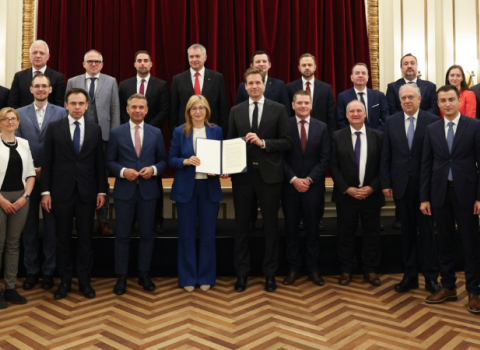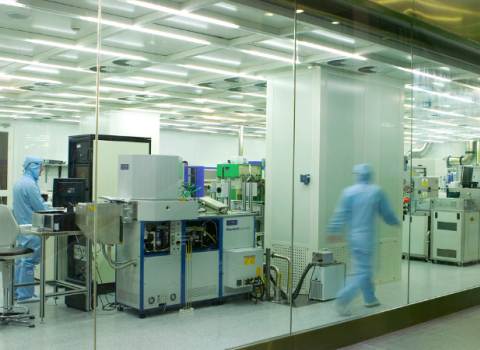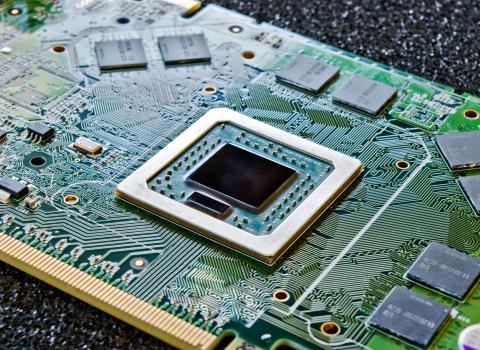The EU has officially launched its Chips joint undertaking, kicking off with a call for four pilot production lines to bridge the gap between research and fabrication

Thierry Breton, EU internal market commissioner. Photo: Jennifer Jacquemart / European Union
The EU opened a call for four pilot lines to allow companies to test new semiconductor designs, at the official launch of the Chips joint undertaking, which was set up to implement the Chips Act.
The Act has already generated more than €100 billion of public and private investment, Thierry Breton, internal market commissioner told some 700 people gathered in Brussels for the launch last week.
The aim is to double the EU’s share of the global semiconductor market to 20% by 2030, and is a response to shortages experienced during the COVID-19 pandemic.
The EU and member states will contribute €11 billion towards research, with national contributions taking the funding for the pilot lines to more than €3 billion. This will, “bridge the gap from lab to fab,” Breton said. “These pilot lines, which should be deployed as of summer 2024, will be absolutely crucial and strategic assets in preparing our industry for the years to come.”
These testing facilities should enable designers to “think about how to make the most advanced product in a matter of years, not decades,” said Yves Gigase, head of programmes at the joint undertaking.
“We are asked by the market to make much more complex circuits with more advanced technology,” he said. The different pilot lines will complement each other, giving companies access to a full range of technologies.
Calls for additional pilot lines are expected to feature in future work programmes.
Backing up the pilot lines will be a cloud-based design platform, to give easy access to IP libraries, electronic design automation (EDA) tools, and support services. This will enable start-ups and SMEs in particular, but also academics, to refine their designs at a lower cost, by reducing the need for up-front investment in IT equipment, and expensive EDA software.
Europe’s share of revenues from ‘fabless’ chip makers, which design semiconductors but outsource production, has fallen from 4% to around 1% over the last decade.
“Our ambition is to make sure start-ups and SMEs that are qualified in Europe will have the same resources that the big companies have already through the aggregation of demand,” said Matthew Xuereb, policy officer at DG CNECT.
As Fabrizio del Maffeo, CEO of Netherlands-based startup Axelera AI noted, half of his company’s €10 million seed funding raised in 2021 was invested in tools and IP. The design platform will help start-ups get to the point where they have a chip to show investors, he said.
Industry professionals want access to the design platform to be open not just to universities, but to primary and middle schools, to illustrate what semiconductors do, and why they are important, and to inspire interest in working in the industry.
Scaling up production
To ease the way from the drawing board and the pilot lines into production, the EU has set up the Chips Fund.
“There is quite a large number of start-ups and SMEs in Europe,” said Marco Ceccarelli, programme officer at DG CNECT. “However, they fail to scale up because of a lack of capital.”
Europe is home to 8.6% of VC-funded semiconductor start-ups, compared to 18% in the US where there are more venture capital firms which specialise in the industry. China meanwhile is home to 60% of funded start-ups, having made chips a strategic priority.
The European Innovation Council’s Accelerator scheme has a budget of €300 million over five years to help semiconductor start-ups on the road to commercialisation and has already selected eight proposals.
The Chips Fund will also leverage the InvestEU programme, which uses guarantees from the EU budget to mobilise public and private investments, starting early next year.
Competence centres
Connecting these different elements will be a network of non-profit competence centres, which will support SMEs and other companies in accessing the design platform, pilot lines, and funding through the Chips Fund.
The centres will also provide education and training, to address the skills shortage which European companies say is a key problem.
The EU will provide financial support for at least one competence centre per participating state, with national governments expected to match this commitment, although countries can decide not to set one up. The EU funding is capped at €1 million per country per year.
Access to these services will be free or at a reduced cost for SMEs and public sector organisations, while larger companies will pay full price.
International scene
The EU is not the only region investing heavily in this area. The US passed its CHIPS & Science Act last year, with $52 billion for manufacturing and R&D. In 2015, China said it would invest $150 billion over ten years to build its semiconductor industry.
As Europe attempts to catch up, Breton acknowledged it will remain reliant on imports. “This is not about doing everything here in Europe,” but “we can only build successful partnerships on mutual strengths,” he said.
International partnerships must be based on reduced dependencies, guaranteeing the security of supply, and preserving Europe’s security interests, said Breton. “The best guarantee we have on security of supply is our interdependencies.”
This does not mean Europe produces only low-end, commodity chips, letting its partners control the market for complex, expensive products. “I had a lot of pressure, believe me, to do this,” Breton said, referring to discussions with counterparts in the US.
The importance of international collaboration was echoed by Christoph Kutter, director of the Fraunhofer research institute for microsystems. “A chip normally flies more than two times around the world before it’s sold, and Europe will not change that,” he said. “Autonomy is not possible in semiconductors,” rather it is more useful to talk about sovereignty that is based on, “having a few extremely strong spots in the value chain,” Kutter said.
Similarly, Luc Van den hove, CEO of the IMEC research centre in Belgium said the Chips Act represents a significant investment, but there are areas where Europe will not be able to catch up. “The philosophy […] is on the one hand to strengthen our strengths, and on the other hand it should be a platform to facilitate global collaboration,” said Van den hove.





 A unique international forum for public research organisations and companies to connect their external engagement with strategic interests around their R&D system.
A unique international forum for public research organisations and companies to connect their external engagement with strategic interests around their R&D system.